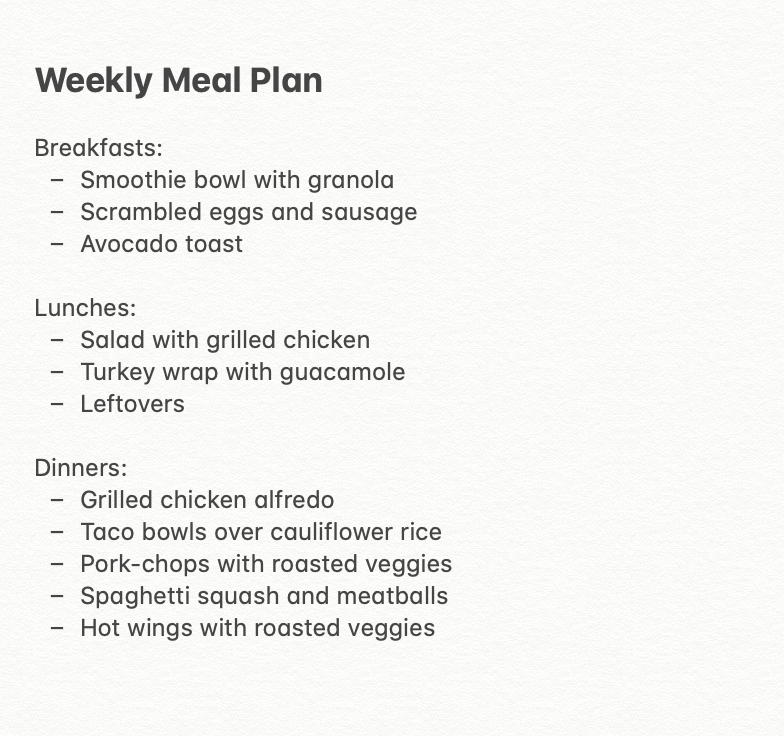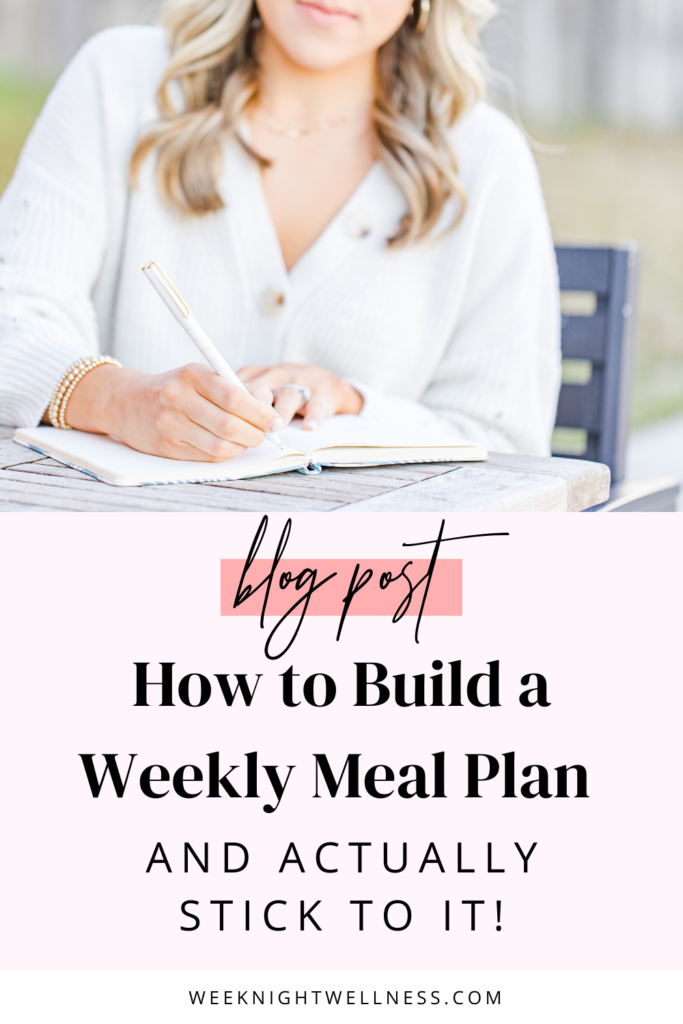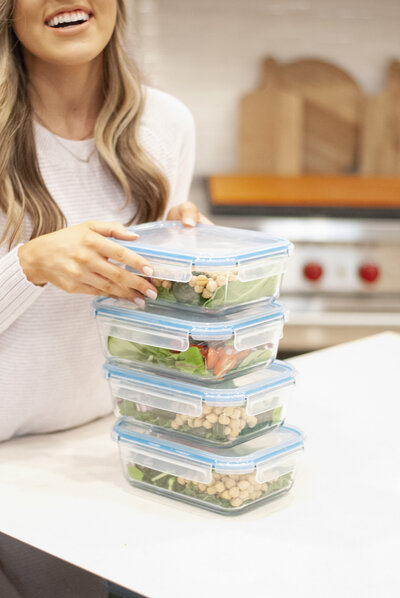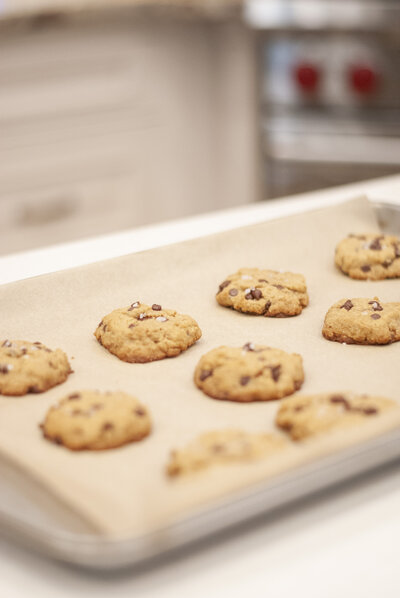Creating a weekly meal plan is a crucial step in changing your eating habits and losing weight.
Without a plan, it’s easy to slip into having a little snack here, a little treat there, and before you know it, you’re eating whenever and whatever you feel…
If this is your current approach and you’re happy with your results, then right on!
If you’re not in loving the results you’re getting with your current way of eating, this post is for you.
Learning how to build a weekly meal plan that you can actually follow through on is the perfect place to start on your health and weight loss journey.
Here’s what you’ll need to know to get started…


What is Meal Planning?
Meal planning is simply creating a plan, in advance, for what and when you will eat.
Often, people utilize meal planning as a means to ensure that what they eat is aligned with their health goals.
However, planning your food in advance can also be helpful by saving you both time and money.
Instead of staring blankly into the fridge every night wondering what to make for dinner before giving up and ordering takeout, you’ll know exactly what’s coming and have all the ingredients ready to go.
When you create a meal plan, you’re essentially asking the question, “what’s for dinner?” once instead of every single day.
Meal Planning vs. Meal Prepping
It’s easy to get meal planning and meal prepping confused…
Meal prep requires that you create a meal plan, but also cook and prepare the food in advance.
While meal prepping is great if you know you won’t have time to cook in the moment (on your way to work, your lunch break, while traveling, etc), I don’t think it’s necessary for everyone.
If you have the time during your days and/or you enjoy cooking, there’s no reason to spend hours in the kitchen on Sunday making all your meals for the week then hoping to eat them all before they go bad!
Meal prepping is optional for reaching your health goals. In contrast, meal planning is a necessary step towards reaching your health goals.
Why You Need a Meal Plan
When you make plans in advance (with your thinking brain), the actions you plan tend to be aligned with your goals, even if that means you have to do the hard thing and seek delayed gratification.
But when left to make choices in the moment, your primitive brain takes over and urges you to seek instant gratification, even when those actions don’t align with your big-picture goals.
If you’ve noticed this happening before, don’t worry! There’s nothing wrong with you…this is how the human brain is wired.
In order for our species to survive in the wild (think caveman days) we had to meet our most urgent needs first.
But now times have changed and we don’t have to hunt for our next meal. So our brain’s primal need to seek instant gratification can really come back to bite us!
To overcome our primitive brain, we make plans in advance.
Just like you plan your work, your vacations, and everything else that’s important in your life, creating a meal plan helps you stay on track and take the action steps necessary to reach your health goals.
Some people do this a month in advance, some do a week, and others just plan one day at a time.
If you’re new to creating and following meal plans, I recommend starting small.
Jumping straight into planning an entire month is the quickest path to overwhelm, burnout, and quitting before you even start.
In this post, I’m laying out the method I use and have seen work best for my clients. So let’s get into it…
How to Make a Weekly Meal Plan
My process is simple and flexible enough that you’ll be able to follow through, even if things come up or your schedule changes through the week.
You start with a 7-day rough outline, then each day, go back in and plan exactly what you’ll eat for the next 24 hours.
This method gives you flexibility, but ensures you always plan in advance (with your thinking brain) instead of in the moment (with your primitive brain).
Step #1 — Decide what food you already have that you want to use this week.
To avoid food waste, I always start my weekly plan by doing a quick inventory of what I already have on hand.
What vegetables are about to go bad in the bottom drawer of the fridge?
What meat have I had in the freezer for ages that I keep forgetting to use?
Once you know what ingredients you already have and need to use, it’s time to move on to the fun part…
Step #2 — Pick out your meal options for the next 7 days.
Before going to the grocery store, I open the notes app on my iPhone and create 3 categories labeled Breakfasts, Lunches, and Dinners. Then, I fill in each category with different meal options that I want to have available to make in each category that week.
To better explain, here’s an example of a recent meal plan I made for my husband and I…


For breakfasts and lunches, I don’t plan to eat something different every day. Instead, I choose just two to three meal options for each.
Maybe you want to eat the same meal every day for breakfast, then rotate between a few options for lunch (or vice versa)? This is totally up to you!
The same is true for dinner… Some prefer to eat the same thing two or more nights in a row, while others prefer to cook a new meal every night.
I personally plan four or five dinner recipes for the week, leaving room for a night or two of eating leftovers or going out.
Be sure to look at your calendar and plan accordingly! If you have 2 work luncheons, a girl’s night out, and a date night, don’t plan to buy more groceries than you can realistically use.
Step #3 — Make your grocery list.
Now that you have a rough outline of the week, it’s time to make the grocery list.
I like using the lists app on my iPhone for this step. You can even create a shared list with your husband or roommates so they can add any household items needed.
The most important thing here is that you think through what you’ll need for each recipe you planned and write down any of the items you don’t already have.
Step #4 — Go shopping!
Once you do steps 1-3, grocery shopping becomes a breeze! You’ll be in and out in no time because you’ve already thought it all through.
Having a list to focus on also makes it easier to avoid browsing those inner aisles where all the unhealthy, processed junk food lives. Why even bother looking if it’s not on your meal plan?
One optional last step is to do a little prep work in the kitchen once you get home with your groceries.
Chopping up some fruits and veggies to store in glass containers at the beginning of the week will set you up to save time during the busy week ahead.
Follow Through and Assess
A crucial step that many people miss is what you do after you make the meal plan…
Without following through on your plan and assessing how it went, you’ll continue feeling stuck and frustrated with your results.
To set yourself up for success in your meal planning, I recommend creating a rough outline for your weekly plan then going back in daily and writing down your finalized 24-hour plan.
Before you think that creating a daily plan will take too long, remember that you’ll have already done all the hard work!
Choosing and writing down what you’ll eat for breakfast tomorrow, out of the 3 breakfast options you outlined for the week, should take you all of 30 seconds, max!
But the effort to write it down is SO worth it. Research shows that we’re 42% more likely to achieve our goals just by writing them down.
– Source: https://michaelhyatt.com/5-reasons-why-you-should-commit-your-goals-to-writing/
So why not give yourself the best chances of success by writing down a food plan each day?
Another benefit to writing this down daily is that your old food plans can now serve as data to help you assess what’s working and not working for you on your path to achieving your health goal.
These daily food logs provide you all the information you need to decide if your current plans are moving you in the right direction.
For example, let’s say that losing 10 pounds is your goal. You weigh yourself after 2 weeks of eating on plan, only to find that you lost 0 pounds.
You can then look at your past 2 weeks of food plans and see exactly what you ate that resulted in no weight loss.
Then you can make the necessary adjustments to your upcoming meal plans to create the results you want to see.
Without the data on what you’ve exactly eaten, you might be tempted to feel confused or stuck…
But by creating a daily plan and following through, you’ll be empowered with the knowledge of exactly what food does and does not work for your goals.
Avoid “Done-for-You” Meal Plans
If you’ve ever searched “meal plan” on Google or Pinterest you know there’s no shortage of done-for-you meal plans available.
Tons of personal trainers, registered dietitians, and even other health coaches offer pre-made meal plans for free or for purchase.
I advice against outsource your meal planning to someone else.
If you do this, you lose a valuable learning opportunity and put off the inevitable; at some point, you have to learn to make healthy choices for yourself to maintain your results long-term.
That’s why I opt-out of providing done-for-you meal plans for my clients, and instead, focus on teaching them how to create their OWN flexible plans.
It’s like the old saying, “Give a man to fish, you’ll feed him for a day. Teach a man to fish, you’ll feed him for a lifetime”.
If you’re curious and want to learn more about how I can help you learn to create and follow through on your own healthy meal plans, I encourage you to check out my health coaching program here.
You can read more about how I help busy, driven young women break through the barriers keeping them stuck to finally reach their goal weight, change their eating habits, and create the healthy lifestyle of their dreams.
One Last Thing…
Creating a weekly meal plan is a crucial steps towards getting the results you want in your health.
When you plan ahead, instead of making choices in the moment, you always plan the actions that align most with your big-picture goals.
Start making your weekly meal plan and set yourself up for success.
I promise, your future-self will be so glad you did.
May 22, 2021












Leave a comment...